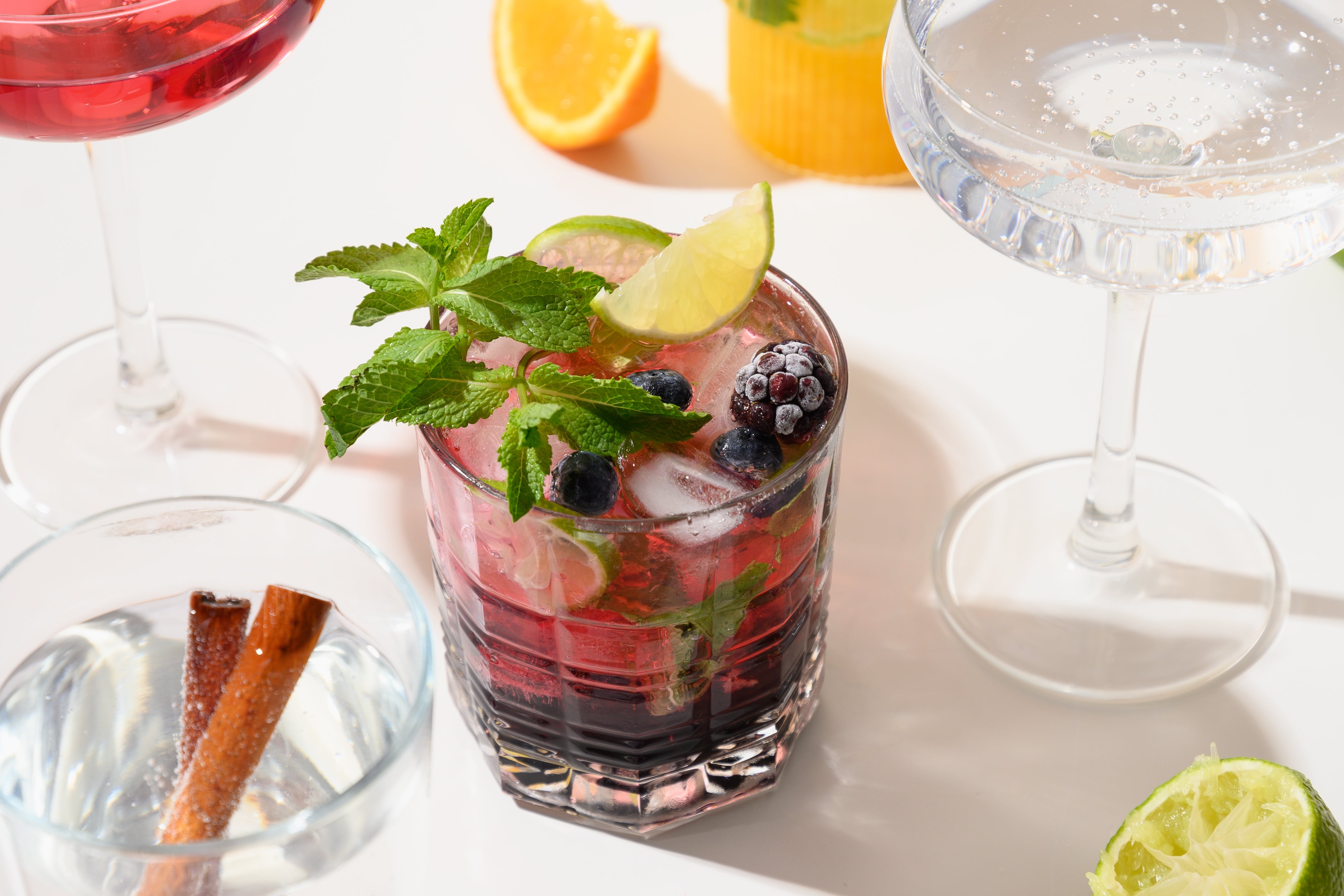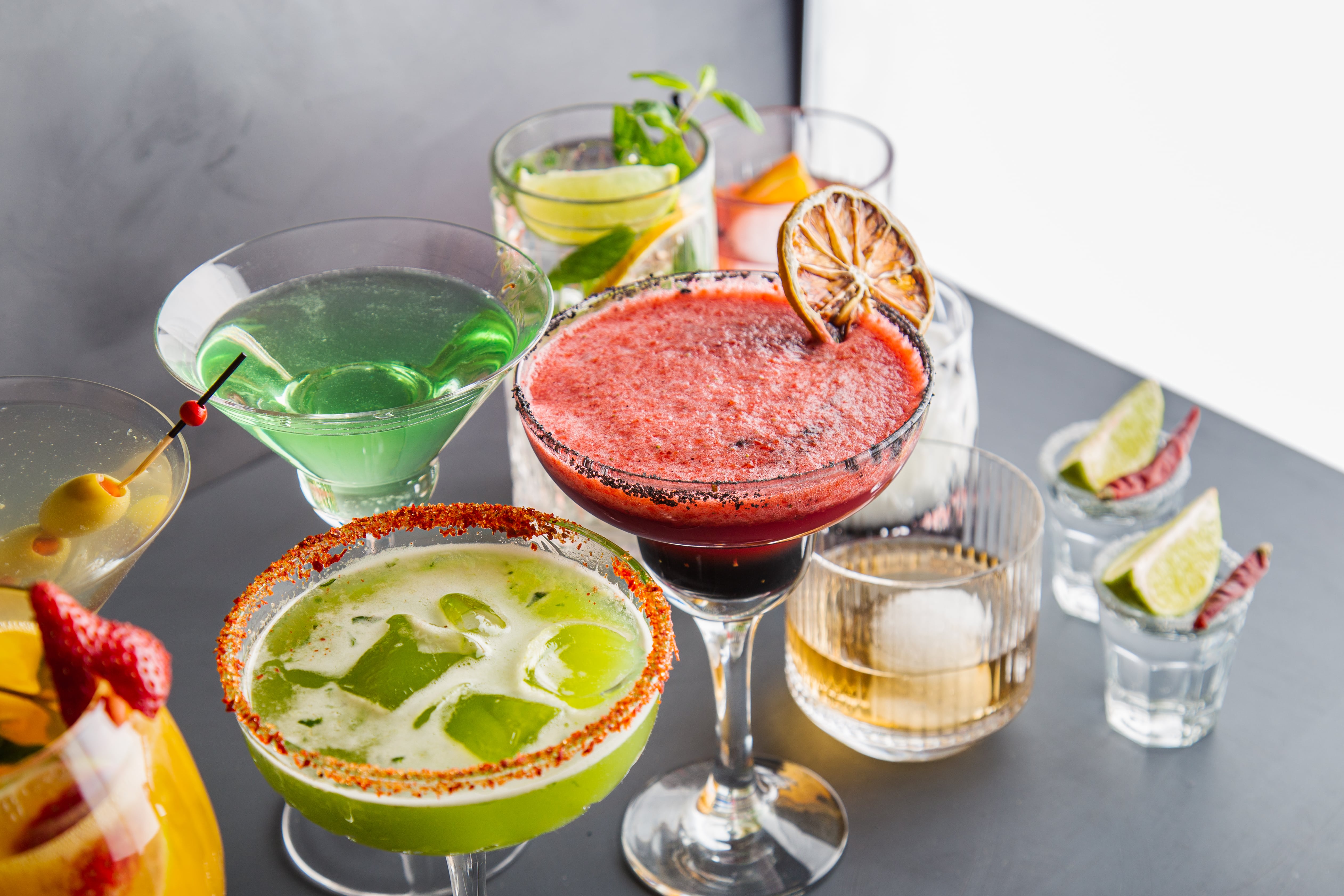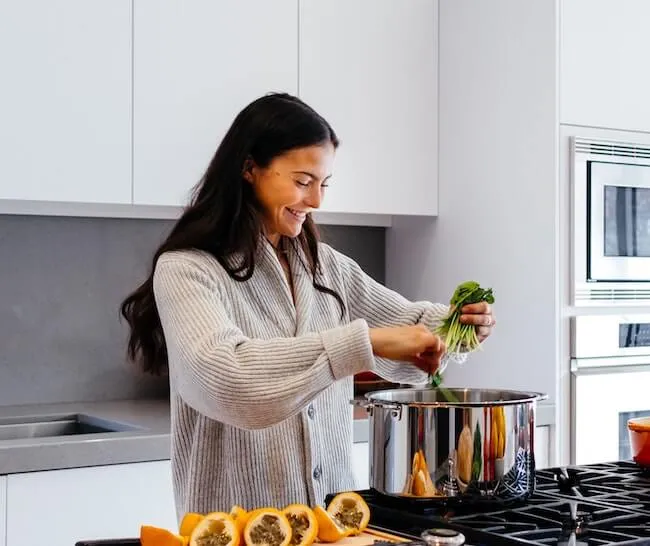Key Takeaways
- Swap sugary mixers and syrups for soda water, herbal teas, and low-glycemic sweeteners to reduce glucose spikes.
- Reimagine your favorites with light spirits and whole ingredients for fun, blood sugar-friendly drinks.
- Check your blood sugar levels often and remember to hydrate to feel your best during celebrations.
{{mid-cta}}
There is nothing quite like indulging in an Aperol Spritz with the perfect amount of ice or enjoying a frozen cocktail (preferably while admiring water views). If you're managing blood sugar levels or trying to manage your weight, however, alcohol can feel like tricky territory.
The good news is that sipping on a refreshing cocktail doesn’t have to be a guilty pleasure. With the right ingredients and a few smart strategies, you can enjoy fun and festive cocktails that won’t spike your glucose or derail your wellness goals.
We’re here to be your metabolic mixologist, ensuring flavor meets function, and every sip is designed with balance in mind.
5 Ingredients to Keep the Impact Low
Building better alcoholic beverages starts with rethinking your ingredients. The standard sugar-laden mixers and syrups are out. Here’s what to use instead:
- Fresh citrus, berries, herbs, and botanicals: Lemon, lime, mint, rosemary, basil, lavender, and berries add flavor and antioxidants without added sugar.
- Low-sugar mixers: Coconut water, soda water, or chilled herbal teas offer a refreshing base with fewer carbohydrates.
- Light spirits: Vodka, gin, tequila, and dry white wine tend to be lower in added sugar and carbohydrates compared to liqueurs.
- Low-glycemic sweeteners: Stevia and monk fruit (used in moderation) provide sweetness without the glucose spikes.
- Low-carb bases: Dry white wine or Extra Brut Champagne have significantly less sugar than beer, so skip the Moscow Mule.
5 Recipes to Try (The Classics - Reimagined)

Craving comfort food without the crash? These five recipes take timeless favorites and give them a metabolic-friendly twist, packed with flavor, lower in glucose impact. Think of it as nostalgia, upgraded.
Cucumber-Mint Cooler
- Ingredients: 1.5 oz vodka, muddled cucumber and mint, splash of lime juice, soda water
- Sweetener option: 1-2 drops of liquid stevia (optional)
- Carbs: 1-2 g carbs
- Glucose note: Cooling and hydrating, this cocktail won’t cause major glucose fluctuations thanks to its unsweetened, low-carb profile.
Berry-Hibiscus Spritz
- Ingredients: 4 oz dry brut champagne, 2 oz chilled hibiscus tea, muddled raspberries and blueberries
- Carbs: 4-5 g
- Glucose note: Brut champagne is low-calorie and lower in sugar than many wines, and the added fiber from berries helps balance glucose levels.
Spicy Ginger-Lime Margarita
- Ingredients: 1.5 oz tequila, 1 oz fresh lime juice, splash of cooled ginger tea, pinch of cayenne
- Sweetener option: 1-2 drops liquid monk fruit
- Carbs: 2-3 g
- Glucose note: This drink has a bold flavor without fruit juices, which can be ideal for those monitoring carbohydrate intake.
Herb-Infused Gin & Tonic
- Ingredients: 1.5 oz gin, spring herbs (basil, thyme, etc.), 4 oz club soda (use this instead of tonic water to cut back on carbs)
- Carbs: 0-2 g (depending on tonic)
- Glucose note: Diet tonic is another way to keep this classic light and blood sugar-safe.
Citrus Rosemary Vodka Collins
- Ingredients: 1.5 oz vodka, lemon juice, splash of soda water, rosemary-infused monk fruit simple syrup
- Carbs: 5 g
- Glucose note: This cocktail is aromatic and bright, with balanced sweetness and no blood sugar surprises.
Smart Swaps & Add‑Ons

Small changes can lead to big results. These smart swaps and simple add-ons help you boost nutrition, balance blood sugar, and keep meals satisfying, without overhauling your entire routine.
- Sparkling water instead of tonic or soda: Zero carbs and zero sugar.
- Soda water + splash of coconut water: Adds electrolytes and a hint of sweetness without excess sugar.
- Homemade herbal syrups: Use monk fruit or stevia to sweeten rosemary, basil, or mint infusions.
- Fresh fruit over fruit juice: Juice is high in sugar. Muddled berries or citrus slices offer flavor with fiber and fewer carbs.
- Low-sugar garnishes: Lime wedges, cucumber ribbons, orange slices, or rosemary sprigs enhance flavor and can make your cocktail extra fancy.
5 Tips for Keeping Glucose in Check

Whether you’re lounging poolside or picnicking, use these tips to stay on track:
- Pair with protein or fat: Enjoy cocktails alongside nuts, cheese, or olives to slow glucose absorption.
- Stay hydrated: Alcohol is dehydrating, and dehydration can lead to glucose spikes. Always alternate cocktails with water or seltzer.
- Monitor your glucose: Use a continuous glucose monitor (CGM) to track your response to alcohol.
- Less is more: Stick to 1 to 2 drinks max. More than this can lead to reactive hypoglycemia or blood sugar crashes later.
- Pace yourself: Sipping slowly gives your body time to process the alcohol and carbs.
When to Skip or Choose Carefully
Not every situation calls for a cocktail. Here’s when it might be better to celebrate with a mocktail instead:
- You’re on medication: Alcohol can interact with GLP-1s, insulin, or other diabetes medications. Check with your healthcare provider to see if it’s safe to consume alcohol.
- It’s extremely hot: Alcohol plus heat can amplify dehydration, raising your blood sugar, and putting stress on your metabolism.
- You’re metabolically sensitive: If you’ve noticed big glucose swings lately, try mocktails or limit alcoholic drinks to special occasions only.
- You're trying to lose weight: Alcohol can increase cravings, impair judgment, and prevent weight loss.
- You're focused on recovery: Your body works hard for you and needs periods of rest and repair. Consider taking regular breaks from alcohol throughout the year.
The Bottom Line

Sipping doesn’t have to sabotage your metabolic health. By using lower-sugar mixers, light spirits, fiber-rich garnishes, and sugar substitutes like stevia or monk fruit, you can create cocktails that support stable blood sugar levels. Remember to limit your number of drinks, stay hydrated, and try to eat protein or healthy fats when you’re drinking.
Fair warning: heat (hot weather) and alcohol can both challenge glucose regulation, but with a little planning and creativity, you can still enjoy your favorite cocktails during any season. Cheers!
Learn More About Health and Healthy Nutrition with Signos’ Expert Advice
Signos incorporates cutting-edge research and the proven power of continuous glucose monitoring to help you reach your health goals. Interested in learning more about nutrition and healthy eating habits? Check out more articles on our blog.
Topics discussed in this article:
References
- Yang, Y., Wu, Y., Sun, X. D., & Zhang, Y. (2021). Reactive oxygen species, glucose metabolism, and lipid metabolism. Oxidative stress: Human diseases and medicine, 213-235.
- Jones, R., Tarter, R., & Ross, A. M. (2021). Greenspace interventions, stress and cortisol: a scoping review. International journal of environmental research and public health, 18(6), 2802.
- Lim, G. Y., Park, E., Song, J. Y., Kwon, R., Kang, J., Cho, Y., ... & Ryu, S. (2024). Lifelog-based daily step counts, walking speed, and metabolically healthy status. Digital Health, 10, 20552076241260921.
- Yaseen, M., & Maharaj, B. A. (2024). Assessment of Heart Rate Variability and Energy Expenditure Index during Ambulation on Uneven Surface Among Young Adults of Aged 18–30 years. Indian Journal of Physical Therapy and Research, 6(1), 94-98.
- Lejeune, T. M., Willems, P. A., & Heglund, N. C. (1998). Mechanics and energetics of human locomotion on sand. Journal of Experimental Biology, 201(13), 2071-2080.
- Hermanski, A., McClelland, J., Pearce-Walker, J., Ruiz, J., & Verhougstraete, M. (2022). The effects of blue spaces on mental health and associated biomarkers. International Journal of Mental Health, 51(3), 203-217.
- Huber, D., Freidl, J., Pichler, C., Bischof, M., Kiem, M., Weisböck-Erdheim, R., ... & Hartl, A. (2023). Long-term effects of mountain hiking vs. forest therapy on physical and mental health of couples: a randomized controlled trial. International journal of environmental research and public health, 20(2), 1469.
- Drexel, H., Mader, A., Saely, C. H., Tautermann, G., Dopheide, J. F., & Vonbank, A. (2021). Downhill hiking improves low-grade inflammation, triglycerides, body weight and glucose tolerance. Scientific Reports, 11(1), 14503.
- Poon, E. T. C., Siu, P. M. F., Wongpipit, W., Gibala, M., & Wong, S. H. S. (2022). Alternating high-intensity interval training and continuous training is efficacious in improving cardiometabolic health in obese middle-aged men. Journal of Exercise Science & Fitness, 20(1), 40-47.




.svg)









.webp)
.svg)
.svg)
.svg)
.svg)
.svg)
.svg)
.svg)
